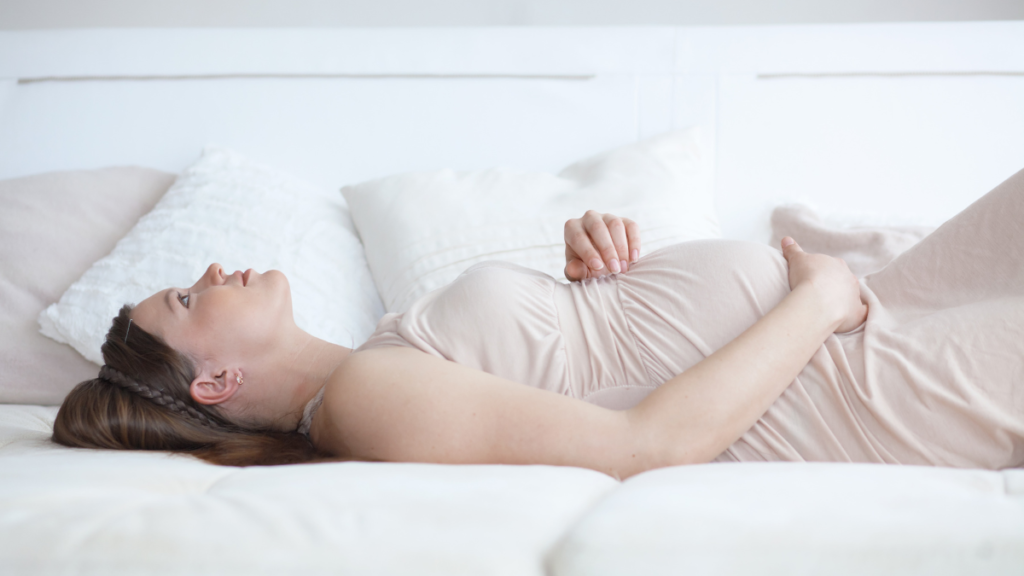
At thirteen weeks pregnant your first trimester is now over and you’re heading into your second. There have been lots of changes going on in your body and your baby has been rapidly developing over the last few weeks. This has brought on new feelings, emotions and side effects you may not have experienced before. Thankfully, you might notice some of the unpleasant symptoms from the early stages of pregnancy easing off at this point.
However, as your baby continues to grow, and your body produces varying levels of pregnancy hormones, there are still a number of pregnancy symptoms you’re likely to experience at week thirteen. Read on for everything you can expect from your body and your baby at thirteen weeks pregnant.
By the end of your first trimester, your baby is about the size of a lemon. At thirteen weeks pregnant, the fetus is usually 2.9 inches (just over 7cm) and weighs nearly 23 grams. Your baby’s body is lengthening, and so now the head equates to about 1/3 of its body size. Although their eyes are now forming, they still won’t open for another few weeks. At this point, your baby’s eyelids are fused shut.
After developing the ability to suck over the previous couple of weeks, your little one may begin sucking their thumb and fingers at this stage. Additionally, your baby will start to swallow the amniotic fluid. This is mainly just water, but also contains vital nutrients needed for further growth and development. Your baby will also start to pass the remaining fluid as urine produced in his kidneys.
As you head into your second trimester, your early pregnancy symptoms may settle, and many women claim they discover a new lease of energy after the three-month stage.
However, there are still a number of side-effects and symptoms that may affect you at thirteen weeks pregnant and beyond.
The extra blood pumping around your body can cause you to feel light-headed, dizzy and even faint. To ease these symptoms, try and remember to stand up and sit down slowly and keep sugar levels up with regular (healthy) snacks. If you feel faint, make sure you take a seat and rest up as soon as possible.
The increased blood flow will also cause your veins to become more visible. Although, you might not appreciate this aesthetically, it’s a good sign as it means there’s an increased blood supply to your growing baby.
You may notice that you’re still sensitive to certain smells and tastes at three months pregnant.
As you approach your second trimester, your fluctuating hormones might lead to a hankering for unusual foods and strange culinary combinations.
As progesterone levels increase, one side effect can be constipation. This often occurs around the second and third month but may worsen as your pregnancy continues.
This pesky progesterone has a lot to answer for. Increased levels of the hormone in your body can also cause bloating at thirteen weeks pregnant. This is because it slows down the digestion process so that there’s more time to pass the nutrients on to your baby. However, in doing so, your growing uterus will squash and press onto your stomach and intestines. Your hormones also relax the valve between your stomach and esophagus, causing heartburn.
One positive symptom many women experience as they enter their second trimester is a lease of energy. This is because the placenta begins to kick into action and takes over the job of providing nutrients for your baby.
Another plus, with higher energy levels and a new rush of hormones, you may find yourself with increased libido. It’s said your new-found high sex drive can even have health benefits for you and your baby. These include improved mood, better sleep and tightening of your pelvic floor muscles – which can help speed up your recovery after birth. However, doctors advise you should abstain if you have a history of early labour miscarriage.
By the end of your third month of pregnancy, your placenta will be fully developed. This means it will take over the role of making sure your baby gets enough oxygen and nutrients via the umbilical cord. It’s also responsible for getting rid of waste products and producing the hormones needed for the rest of your baby’s development.
For some women, the thirteen-week stage is when you might start to see the beginnings of a baby bump. It’s normal to start showing anywhere between 12 to 16 weeks, however, other women might not have a bump until well into their second trimester.
This is where things get exciting. From about 10 or 11 weeks you’ll be ready for your first of two very important scans. This is known as the ‘dating scan’.
Although often dubbed the 12-week scan, this can take place anytime between 10 and 14 weeks. At this appointment, a sonographer will carry out an ultrasound which will be used to give you an estimated due date.
The scan will also look at a few other things. These include:
For more information on development and milestones at every stage of your pregnancy, visit our pregnancy week by week guide.

© 2023 All rights reserved Baby & Toddler - part of parent promotions